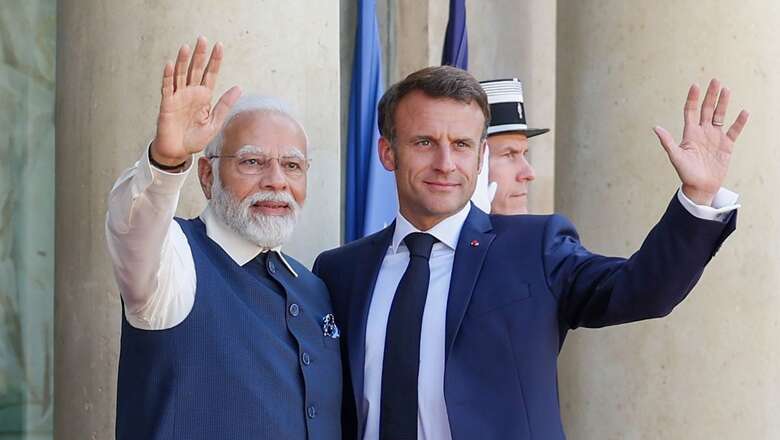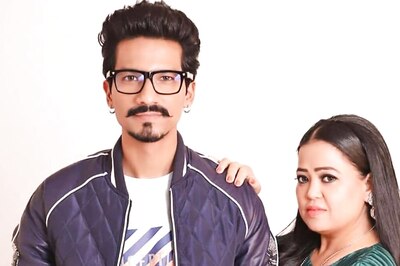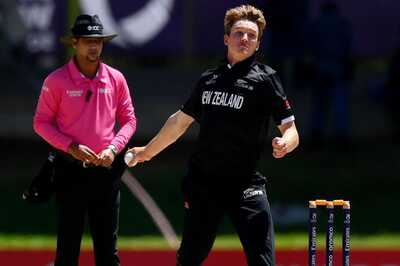
views
President Emmanuel Macron’s invitation to Prime Minister Narendra Modi to be the chief guest at Bastille Day on July 14 and decorating him with the Grand Cross of the Legion of Honour, the highest French decoration, indicates that France seeks to further deepen its already close partnership with India.
French stakes in India, as of the US and the West in general, are becoming bigger with India, as the other Asian giant, rising economically. Already the fifth-largest economy, it is expected to become the third-largest by 2027. Its democracy makes it a less threatening partner than autocratic China, which is now seen also by Europe as presenting a systemic challenge to the West, even if Europe is loath to confront it in the manner the US is doing.
France and others have noted that India is now the most populous country, with a young, aspirational population that with rising living standards will provide a huge consumer base. India’s human talent is recognised; the fact that the CEOs of major US tech corporations are headed by persons of Indian origin is well noted.
European powers, with their small populations, and recognising that global power is shifting eastwards, know they cannot dominate the world as they have done for centuries, and are therefore looking for new equations with countries like India. Trade, investments, collaborations in emerging technologies, de-risking supply chains etc., more people-to-people contacts, are on the agenda.
France, always struggling with the Anglo-Saxon powers for room, has that much more interest in forging close ties with an independent-minded English-speaking country like India. This is where French and Indian attachment to “strategic autonomy” comes in, though France wants to exercise it while being part of an alliance that ultimately provides it security cover, while India, not being part of any alliance, does it under more exposed security conditions. France also now values India as a partner in ensuring maritime security in the Indo-Pacific region. India has the strongest navy in the Indian Ocean area where France has territories and military presence.
In a more fractured world pitting “democracies” versus “autocracies”, with the Western alliance facing a stronger and growing Russia-China strategic partnership, India, as a member of BRICS and the SCO, as well as the Quad and I2U2 and other plurilateral groups with western countries or their allies, is seen as a useful bridge between the developing antagonisms. India assuming the leadership of the Global South in the context of its G 20 presidency is an additional reason why France would want to use its ties with India to buttress its strategic autonomy, project itself as more receptive to the interests of the developing countries, and use its weight as permanent member of the UN Security Council and the only nuclear power in Europe (with BREXIT) to develop its own personality in global politics.
The fact that so many countries are lining up to join BRICS and the SCO is getting enlarged as well, India becomes useful to France for engaging the BRICS countries in particular, which explains its attempt to obtain an invitation to the BRICS summit in South Africa in August this year. India is also useful to France in terms of expanding its membership and participation in various Indian Ocean organisations, which India supports.
India too wants to consolidate further its strategic partnership with France in its own national interest. France is the 7th largest economy in the world. It has overtaken the UK as a tech nation according to a 2022 report on European tech. It has strengths in sectors such as aerospace, defence, automotive, nuclear, medical devices, energy transition, transportation, smart cities, urban development, food processing, digital technology etc. Its startup scene is thriving. India would want to forge more cooperation in many of these areas for its own development.
In many of these areas, India and France have actually cooperated over the years. Despite India not signing the NPT, France has cooperated with our nuclear sector on safety issues for decades. Its Ariane rockets have launched several of our communication satellites. We have launched jointly developed weather satellites. Our defence ties go back to the 50s, but entered into an enhanced phase with the Scorpene project and India’s acquisition of 36 Rafales equipped with advanced missiles. France has never imposed sanctions on India, even after our 1998 nuclear tests. Even if the Jaitapur nuclear power project, under discussion for years now, has yet to be finalised, it does not detract from the strength of France in nuclear technology.
India would want to expand trade and investment ties with France. Trade between India and France at about Euros 12.6 billion is well below potential. French investments in India amounted to Euros 11 billion in 2021. Indian investments in France are minuscule.
Modi’s visit was an occasion to lay the foundations of a longer-term strategic relationship spanning the next 25 years, for which the two countries adopted the “Horizon 2047 Roadmap on the 25th Anniversary of the Indo-French Strategic Partnership: towards a century of French-Indian relations”. Modi and Macron noted that the partnership had already become one of regional responsibilities and global importance, with a common quest for a stable multipolar world, and with the defence and security partnership extending from seabed to space, with digital, innovation and startup partnership as new areas of growth.
The larger geopolitical picture of India-France ties is often missed both in India and France where the media and foreign policy observers tend to focus almost exclusively on French defence sales to India. This distorts the larger canvas on which India and France have cooperated and will do so more in the future.
Prior to Modi’s visit, the centrepiece of interest was India’s purchase of 26 Rafales (naval version) for its new aircraft carrier and the Naval Group France constructing 3 additional Scorpene submarines in India. In the event, no formal announcement to this effect was made during the visit, with the joint statement merely referring to India and France being “ready to explore more ambitious projects to develop the Indian submarine fleet and its performance”. Clearly, India preferred these projects to be dealt with without advance formal commitment in a joint statement, keeping in mind the hard negotiations that are inevitable on issues of price, transfer of technology, time frames etc. The government might have also wanted to defuse unprincipled opposition attacks at home that the quid pro quo for the special invitation to Modi were these two defence contracts.
The joint statement does recognise that France is one of India’s key partners in the development of a self-reliant defence industrial and technological base. The two countries will cooperate in the joint development of a combat aircraft engine, will support industrial cooperation for motorisation of heavy-lift helicopters under the Indian Multi Role Helicopter [IMRH] programme with Safran Helicopter Engine, France. The Garden Reach Shipbuilders and Engineers Ltd. (GRSE), and Naval Group France will also collaborate in the field of surface ships. To this end, both countries are also working towards adopting a Roadmap on Defence Industrial Cooperation.
India and France have adopted a new Indo-Pacific Roadmap during Modi’s visit, which includes extending their cooperation to the Pacific. This cooperation will cover defence, security, economic, connectivity, infrastructure, sustainability and human-centric development. Trilateral cooperation in the Indo-Pacific region is also envisaged through the dialogue launched with the United Arab Emirates and with Australia.
In space, the two sides will strengthen their partnership on the two axes of climate and environment, with the development of the TRISHNA mission and activities within the Space Climate Observatory (SCO), space exploration (Mars, Venus), maritime monitoring, launchers and manned flights in connection with India’s Gaganyaan programme etc.
India and France have each been victims of terrorism and intend to strengthen cooperation in all aspects in order to stay ahead of the evolving threat. This would include operational cooperation, multilateral action, countering online radicalisation and combating financing of terrorism, particularly through the No Money for Terror (NMFT) initiative and the Christchurch Call to Action to Eliminate Terrorist and Violent Extremism Content Online.
France has been supporting for years India’s permanent membership of the UN Security Council. In the joint statement, a new note has been introduced by both countries jointly supporting “the credentials of the G4 and therefore those of India, to join the Security Council as new permanent members”. Why India’s candidature has been linked to that of Germany and Japan in a bilateral text with India is not clear.
The joint statement recognises that India and France are the central Start up and innovation ecosystems in their respective regions. With that in view, they have agreed to further deepen their cooperation to promote research partnerships and technologies and facilitate bilateral cooperation through enhanced connectivity between their respective Start up and entrepreneurial networks. India and France are strengthening their bilateral cooperation on advanced digital technologies, particularly in the fields of supercomputing, cloud computing, Artificial Intelligence and quantum technologies, including in the framework of the Global Partnership on Artificial Intelligence (GPIA).
India has been working on introducing the Unified Payment Interface in France. Some initial success has been achieved with this payment mechanism going live by September, 2023 with the Eiffel Tower as the first merchant in France to accept UPI.
The discussions related to the Jaitapur Nuclear Power Project (JNPP) continue. France has offered to train civil nuclear engineers and technicians from India for deployment in projects with EPR reactors. Both countries have agreed to work on establishing a partnership on Small Modular Reactors (SMR) and Advanced Modular Reactors (AMR).
Other areas identified for intensified cooperation are health, renewable energy, transition towards a low carbon economy, energy security, fighting against climate change (now an obsession in France), the blue economy, innovation in decarbonated hydrogen production capacities and regulatory standards, environmental/plastic pollution, biodiversity, sustainable buildings, urban transition, integrated waste management, transport and urban mobility, deepening of people-to-people and economic ties through promotion of tourist flows and facilitation of the issuance of visas for the private sector and the business community, mutual recognition of diplomas and professional qualifications in order to encourage skilled mobility between the two countries, and the National Museum of India project.
Importantly, France will issue five-year validity Schengen visas for Indian students under some conditions. France has the ambition to welcome 20,000 Indian students by 2025 and 30,000 in 2030.
All in all, the canvas covered during Modi’s visit to France was vast. The broad lines of cooperation have been identified, with some concrete decisions and much that will require time and effort to translate into reality. The larger point is that India and France can each gain substantially from expanding ties in a host of identified domains.
Kanwal Sibal is a former Indian Foreign Secretary. He was India’s Ambassador to Turkey, Egypt, France and Russia. Views expressed in the above piece are personal and solely that of the author. They do not necessarily reflect News18’s views.




















Comments
0 comment